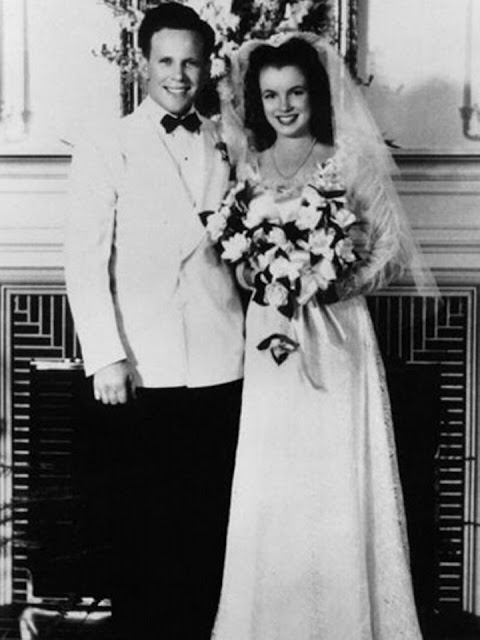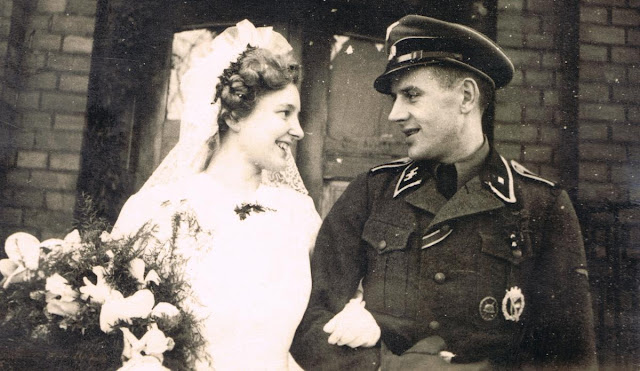One of the biggest long-term effects of the war was the creation of the "Baby Boom" generation. They were the children of the people who lived through the war, who then had children in the years after World War II when wartime service was a thing of the past and couples could settle down in Levittown and Akron.
 |
| Lockheed worker "Big Jim" Dougherty and his lady, June 1942. Do you recognize the blushing bride? I think you know a lot about her. She was just 16, and her initials in later years were MM. |
The Boomer generation is generally considered to have begun in 1946 and ended in 1964.
 |
| Tyrone Power with his first wife, French actress Annabella, 1943. |
Here are some pictures of the couples who likely participated in making the Boomer generation happen. Most of them are wedding photos, though not all. This is another of my "pointless" pages, such as my one on cats in World War II, which simply aims to capture a moment in time, the reality of life for ordinary people without dramatizing things by showing some epic battle or valiant deeds. This sort of scene was as relevant, or actually more relevant, to the people pictured than dramatic images of some shell exploding on a beach or a random plane firing its guns.
I have names for some of these couples, but really, that kind of detail is kind of irrelevant to my purpose. I'm just trying to show life during the war, what it was like on the home front.
 |
| It was fashionable at the time for brides to wear their best dress/outfit in their wedding photos rather than their actual wedding gown. |
 |
| Wait.. what? Two mokes in a photo booth, probably on 42nd Street. |
 |
| Just to be, you know, fair about these things.... The Bronx lady on the right has a classic '40s look, if it's not her own wedding it is probably someone else's. I assume her mink is inside; she could use a nice brooch to complement the necklace. I don't know what the foofy thing is on her shoulder, it look somewhat familiar but in any event it's a bit much. I am a little surprised at the dark gloves, but they do go with the purse and shoes; personally I think white or tan would have been a better choice, but then, this isn't a color photo so I can't really tell. They are probably very nice leather. Let me just say that lady is sharp. Word is this is 1949, so I'm cheating a bit on the war connection, but she made the dress herself. As for the other lady, her godmother, I hope her leg didn't hurt too bad where those band-aids are. |
German Section
 |
| An SS wedding. |
 |
| Maybe a future wedding? |
 |
| Wehrmacht wedding. |
 |
| You know what they say about working for the same employer.... |
 |
| He survived long enough to get all those decorations, he'll survive marriage, too. |
 |
| These two actually seem to like each other. |
 |
| These two also. I sense a possible match. Mom and dad look okay with it, too. |
 |
| A couple parts, perhaps forever, at Penn Station in New York City, 1943. |
2021












Regarding the wedding photo where it is commented that wedding photos frequently featured the bride wearing her "best dress" or other outfit than her actual wedding gown - those photos were taken of the bride WEARING her "actual wedding gown." Weddings in Wartime were frequently "hurry up" affairs, at home in the living room by a quickly decorated fireplace or bay window, or downtown at the courthouse, at the Justice of The Peace, etc.
ReplyDeleteIt was not a "big white wedding" with bridesmaids and lots of flowers, and all the other trappings of the ceremonies that became so very popular in the booming economy of the Postwar years. They happened from time to time, to couples whose parents were usually well-to-do, and the planning for the ceremony had already been started some time before. Generally those grooms were officers, and able to come up with leave time on a more reliable schedule than the drafted enlisted man.
The economy didn't support every couple having a fancy church wedding, especially during the prewar years of the Depression, which was still having effects on bank accounts even during the War, and people's expectations varied widely with the families' social status and financial circumstances. Money had been quite hard to come by during the previous decade, and even harder to part with, and families of modest means lived within them and didn't generally try to put on a flashy show that they weren't prepared to pay for. Even if they tried, they knew they would be seen by others as "putting on airs" and trying to show off, and that wasn't considered acceptable back then. The many enlisted grade bridegrooms were frequently already in uniform and subject to the last minute whims of the needs of the military, where 48 hour passes were hard to come by. So, brides were more flexible, and most often DID wear a best dress, even if it were a brand new dress that became part of her trousseau and could be worn again for other dressy occasions such as church on Sunday, someone else's wedding, etc. Coming out of the Depression as they all were, those were the kinds of weddings that were most common anyway. A white formal wedding gown that could only be worn once just wasn't a practical expenditure for most brides. And sometimes brides who wore one for their ceremony at home or in their small home church, if it could be arranged, were wearing a borrowed gown from a sister, or a cousin, a best friend who had already married, or even Mother's gown if it didn't require much alteration and was appropriately styled. But a "street length" dressy dress or suit, with hat, gloves, and shoes (which were rationed if they were leather) was a much more practical expenditure. Adding a corsage which often took the place of the bridal bouquet, gloves, a pretty necklace, a hat with a little veiling, would dress it up further for her own ceremony.
There were even publicized occasions where group weddings were arranged and held on military bases for quite a few couples at the same time, organized by the wives of the higher ranking officers already present on the base, officiated by the base chaplains, and held to make a pleasant occasion for many enlisted couples at the same time. The bride of the highest ranking groom and her new husband were given the honor of cutting the first slice of a large cake baked and decorated by the mess hall cooks, who were sometimes already trained and talented bakers in civilian life. Corsages were provided for the brides, photos were taken by photographers already on base. So, brides had to be available to travel to wherever her groom was stationed, and bring all her wedding items with her. Traveling on overcrowded trains or buses with a long white gown in tow just wasn't practical, and the "dress code" already established for the brides didn't call for it.
Why does Minnesota elect a Somali who married her Brother ? YUCK
ReplyDelete